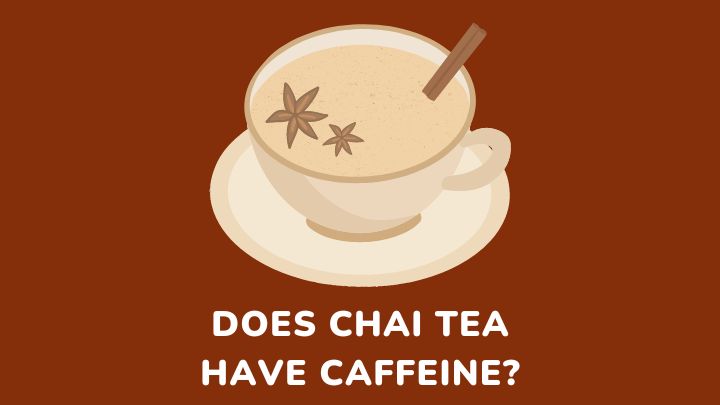Chai tea is black tea mixed with a blend of honey and spices, including cardamom and cinnamon. It’s brewed with water, and milk is usually added.
Chai has always been extremely versatile, with preferred spices and ways to prepare it varying from one region or person to the next.
Understanding the caffeine content in beverages is crucial for making informed choices about our daily consumption.
In this article I’ll address a very important question: does chai tea have caffeine?
As you read on you’ll find how chai tea is made, its effects on the body, variations in caffeine levels, and options for enjoying decaffeinated versions.
What is chai tea?
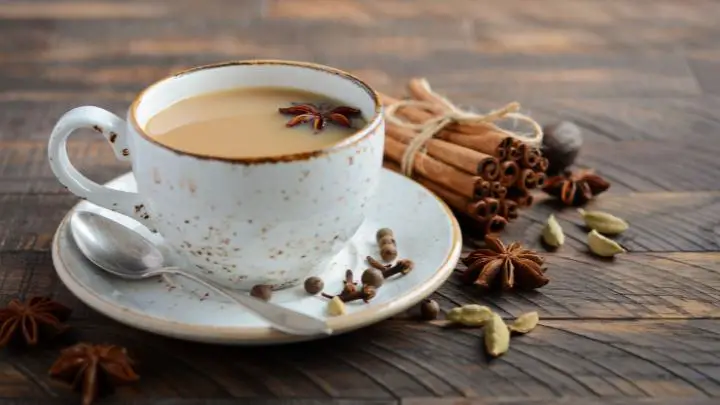
Chai tea, also known as masala chai, originated in India and holds significant cultural importance. It’s a flavorful beverage enjoyed by people worldwide.
The traditional recipe includes a blend of black tea, aromatic spices, and herbs. Commonly used ingredients are cinnamon, cardamom, cloves, ginger, and black pepper. These spices not only impart a rich flavor but also offer various health benefits.
Chai tea is often brewed with milk and sweetened with sugar or honey, creating a creamy and indulgent drink. Its warm and comforting taste makes it a favorite choice for cozy gatherings or moments of relaxation.
Caffeine and its effects
Caffeine is a natural stimulant found in various beverages like tea, coffee, and soda. It works by blocking the action of adenosine, a neurotransmitter that promotes relaxation, leading to increased alertness and concentration.
Upon consumption, caffeine swiftly makes its way into the bloodstream, reaching peak levels within 30 to 60 minutes. Its effects can last for several hours, providing a temporary boost in energy and mental clarity.
While caffeine offers benefits like enhanced focus and improved mood, excessive intake can lead to adverse effects such as insomnia, jitteriness, and increased heart rate.
For most adults, the recommended limit is around 400 milligrams of caffeine per day, equivalent to about four cups of brewed coffee.
Does chai tea have caffeine?
Several factors influence the caffeine levels in chai tea. The type of tea used as the base—whether black, green, or herbal—affects the final caffeine content.
Additionally, brewing time and the ratio of tea to water play crucial roles in determining caffeine levels.
Compared to coffee or energy drinks, chai tea typically contains less caffeine per serving. However, it’s important to note that the exact caffeine content can vary among different chai tea brands and recipes.
For individuals seeking a caffeine-free alternative, decaffeinated chai teas offer a solution. Through a specialized process, most of the caffeine is removed while preserving the tea’s distinct flavor profile.
While chai tea may contain some caffeine, the caffeine content is comparably lower than the caffeine content in some beverages.
So, whether you prefer a traditional chai latte or a spicy masala chai, rest assured that you can enjoy your favorite brew while managing your caffeine intake according to your preferences and lifestyle.
How much caffeine is in chai tea?
A cup of chai tea contains about 40mg of caffeine, which is nothing compared to the 80-120mg of caffeine present in a similar cup of coffee.
Chai tea is a good alternative to coffee if you are trying to reduce your coffee intake. It can give you the jolt you want from coffee but with less side effects.
How is chai tea made?
Traditional preparation methods
In its traditional form, chai tea is brewed by simmering a blend of black tea leaves, aromatic spices, and water over low heat. This method allows the flavors to meld together, creating a rich and complex brew.
Brewing techniques and variations
While the traditional method remains popular, there are many variations to suit different tastes and preferences.
Some may prefer to steep the tea leaves in hot water, while others opt for a quicker brewing method using tea bags or instant chai mixes.
The method of preparation can influence the caffeine content in chai tea. Longer brewing times or using a higher ratio of tea leaves to water may result in higher caffeine levels.
Additions and influence on caffeine
The addition of milk, sugar, or other ingredients does not significantly alter the caffeine content in chai tea. However, these additions can enhance the flavor and texture of the beverage, creating a creamy and indulgent treat.
Health benefits of chai tea
Chai tea isn’t just a delicious beverage; it also offers a variety of health benefits that can contribute to overall well-being.
Antioxidant richness
Chai tea contains a blend of spices like cinnamon, cloves, and ginger, which are rich in antioxidants. These compounds help protect cells from damage caused by free radicals.
Digestive support
The spices in chai tea, such as ginger and cardamom, have been traditionally used to aid digestion and alleviate digestive discomfort.
Immune boost
Ingredients like ginger and cloves possess antimicrobial properties that may help support the immune system, reducing the risk of infections.
Heart health
Research suggests that certain spices found in chai tea, like cinnamon and cardamom, may help lower cholesterol levels and improve heart health.
Stress reduction
Enjoying a warm cup of chai tea can be a comforting ritual that promotes relaxation and reduces stress levels. Incorporating chai tea into your daily routine can be a flavorful way to support your health and well-being.
Potential health risks of chai tea
While chai tea offers numerous health benefits, it’s essential to be aware of the potential risks.
Caffeine sensitivity
For individuals sensitive to caffeine, consuming chai tea may lead to side effects like jitteriness, increased heart rate, or difficulty sleeping.
Added sugar
Chai tea prepared with added sugar can contribute to increased calorie intake and may negatively impact dental health and blood sugar levels, especially for those with diabetes.
Allergies
Some individuals may be allergic to certain spices commonly found in chai tea, such as cinnamon or cloves, leading to allergic reactions or gastrointestinal discomfort.
Acid reflux
The combination of tea and spices in chai tea may exacerbate symptoms of acid reflux in individuals prone to gastrointestinal issues.
Interaction with medications
Certain spices in chai tea, like ginger or cloves, may interact with medications, potentially affecting their effectiveness or causing adverse reactions.
While chai tea can be enjoyed in moderation as part of a balanced diet, it’s essential to be mindful of these potential health risks and consult with a healthcare professional if necessary.
How to moderate your caffeine intake with chai tea
For many, chai tea serves as a comforting companion throughout the day. However, managing caffeine intake is essential for enjoying this beloved beverage safely and responsibly.
Individuals vary in their sensitivity to caffeine, influenced by factors such as age, weight, and genetics. Being mindful of your body’s response to caffeine can help guide your consumption.
To moderate caffeine intake from chai tea, consider opting for decaffeinated versions or reducing the number of cups consumed per day. Choosing lighter brews or shorter brewing times can also lower caffeine levels.
Savoring chai tea in moderation allows you to enjoy its rich flavors without overindulging in caffeine. Be mindful of portion sizes and consider alternating between caffeinated and caffeine-free options throughout the day.
Incorporating strategies like keeping track of caffeine consumption, setting limits, and practicing mindfulness can aid in managing caffeine intake effectively.
Additionally, staying hydrated with water and balancing chai tea with other beverages can help maintain overall hydration and well-being.
Are there caffeine-free versions of chai tea?
Yes, there are caffeine-free versions of chai tea. These versions are often made with herbal teas like rooibos or decaffeinated black tea.
Accompaniments of chai tea
Biscuits and cookies
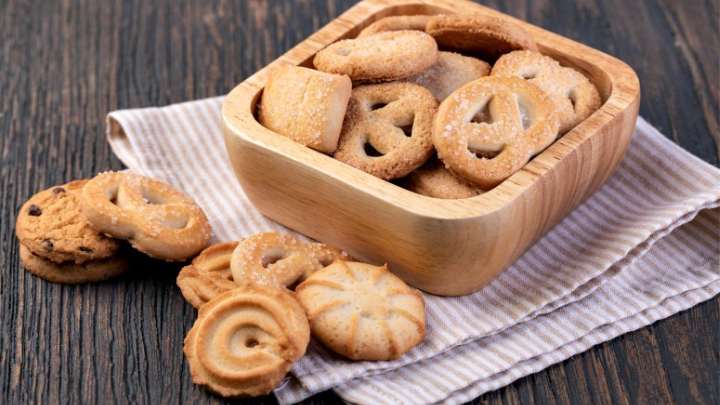
Indulge in the classic combination of chai tea with biscuits or cookies. The subtle sweetness of these treats complements the bold flavors of chai tea, creating a delightful harmony of tastes with every sip.
Savory snacks

For those craving something savory, consider pairing chai tea with snacks like samosas, pakoras, or savory pastries. The spices in chai tea complement the savory flavors of these dishes, making for a satisfying and well-rounded snack.
Pastries and cakes
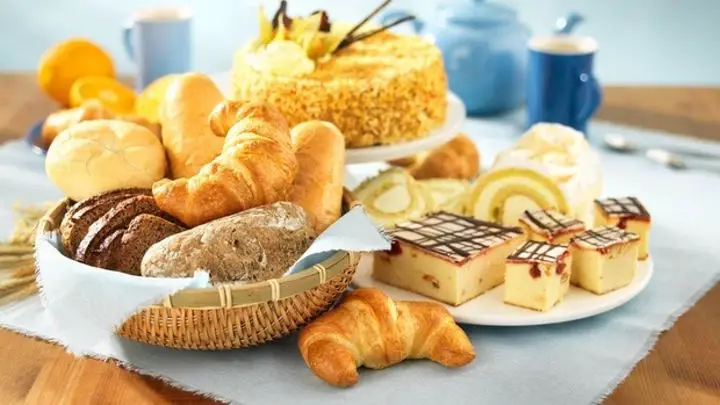
Treat yourself to the decadence of pastries or cakes alongside your chai tea. Whether it’s a slice of cake or a flaky pastry, the indulgent sweetness pairs beautifully with the warm, aromatic notes of chai tea, creating a luxurious tea-time experience.
Fruits and nuts
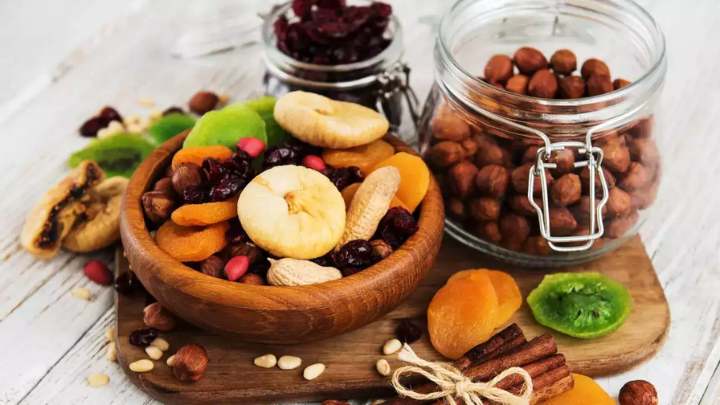
For a lighter option, enjoy chai tea with a selection of fresh fruits and nuts. The natural sweetness of fruits and the crunch of nuts provide a refreshing contrast to the bold flavors of chai tea, offering a healthy and satisfying accompaniment.
Cheese and crackers
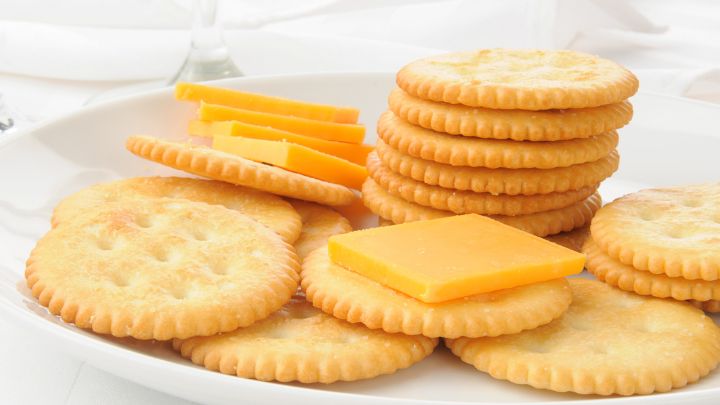
Pairing chai tea with cheese and crackers creates a delightful balance of flavors and textures. The creamy richness of cheese complements the spiciness of chai tea, while the crispness of crackers adds a satisfying crunch to each bite.
Yogurt and granola
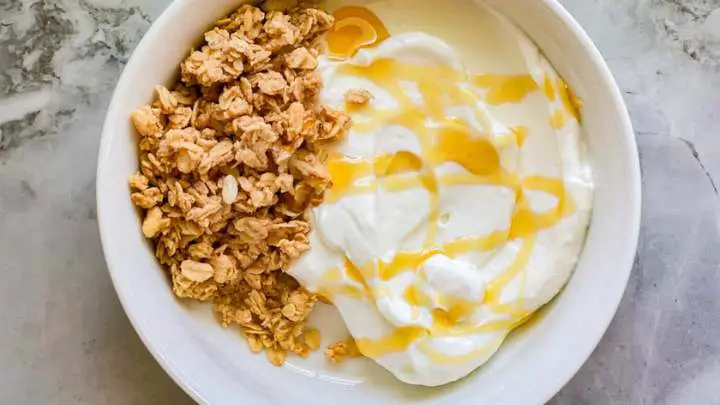
Start your day on a wholesome note by pairing chai tea with yogurt and granola. The creamy texture of yogurt and the crunch of granola provide a satisfying contrast to the warm, comforting flavors of chai tea, making for a nourishing and satisfying breakfast.
Chocolate
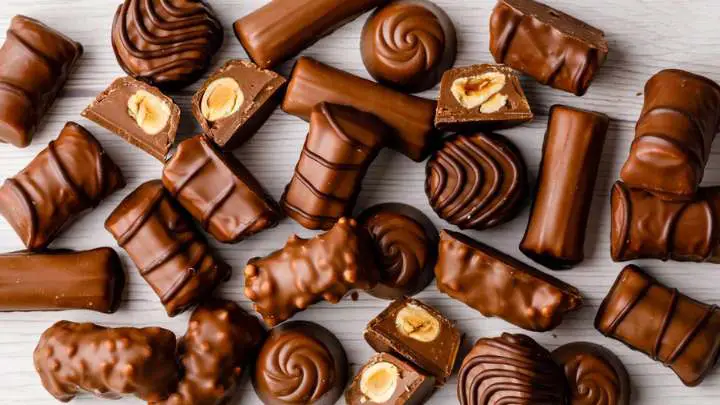
Indulge your sweet tooth with the luxurious pairing of chai tea and chocolate. Whether it’s a piece of dark chocolate or a chocolate-covered treat, the richness of chocolate enhances the bold flavors of chai tea, creating a decadent and indulgent treat.
Dips and spreads
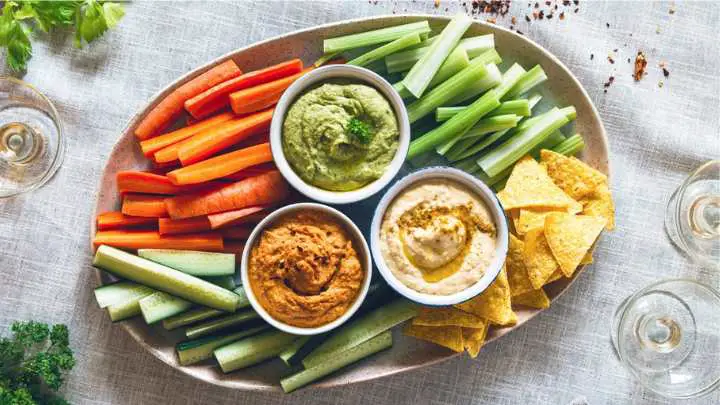
Experiment with a variety of dips and spreads to accompany your chai tea. From hummus and tzatziki to chutneys and salsas, the bold flavors of these condiments complement the spiciness of chai tea, adding an extra layer of complexity to your tea-drinking experience.
Homemade treats
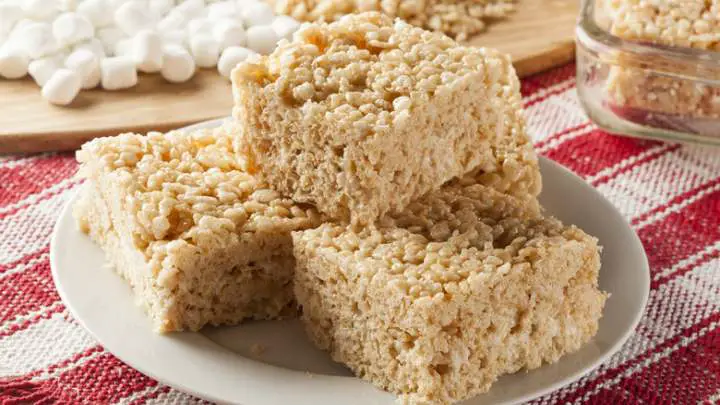
Get creative in the kitchen and whip up some homemade treats to enjoy with your chai tea. From muffins and scones to cookies and bars, the possibilities are endless when it comes to homemade accompaniments for chai tea.
FAQs
What’s the difference between chai tea and chai latte?
Chai tea is a spiced black tea brewed with spices like cinnamon, cardamom, and ginger, while chai latte is made with chai tea and steamed milk, often sweetened.
Does chai tea have more caffeine than coffee?
No, chai tea generally has less caffeine than coffee, but it still contains caffeine from the black tea used as its base.
Will chai tea keep you awake?
Chai tea may keep you awake if consumed in large amounts due to its caffeine content, but it’s usually not as stimulating as coffee.
Can chai tea provide an energy boost?
Yes, chai tea can provide an energy boost due to its caffeine content, but the effect may vary depending on individual sensitivity to caffeine.
Conclusion
While chai tea contains caffeine, its content is generally lower in comparison with coffee. This makes it a suitable choice for those seeking a flavorful alternative without excessive stimulation.
With options for both traditional brewing methods and innovative variations, you can customize chai tea to suit your preferences and dietary needs.
Are you looking to reduce your caffeine intake? You can go for the decaffeinated chai tea option which undergoes a specialized process to remove most of the caffeine while retaining its rich flavors.
However, if you take caffeine but do not get results, here are the possible reasons why and how to fix it.
Thanks for reading.
